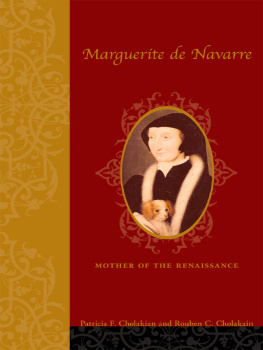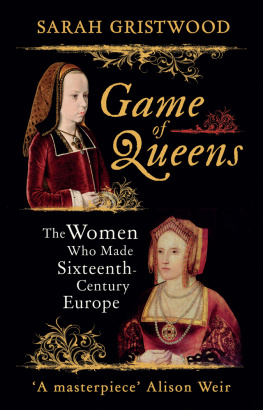
THE POWER AND PATRONAGE OF MARGUERITE DE NAVARRE
Women and Gender in the Early Modern World
Series Editors: Allyson Poska and Abby Zanger
In the past decade, the study of women and gender has offered some of the most vital and innovative challenges to scholarship on the early modern period. Ashgate's series of interdisciplinary and comparative studies, 'Women and Gender in the Early Modern World', takes up this challenge, reaching beyond geographical limitations to explore the experiences of early modern women and the nature of gender in Europe, the Americas, Asia, and Africa.
Titles in the series include:
Architecture and the Politics of Gender in Early Modern Europe
Edited by Helen Hills
The Medici Women Gender and Power in Renaissance Florence
Natalie R. Tomas
'Shall She Famish Then?' Female Food Refusal in Early Modern England
Nancy A. Gutierrez
Gender, Society and Print Culture in Late-Stuart England The cultural world of the Athenian Mercury
Helen Berry
Widowhood and Visual Culture in Early Modern Europe
Edited by Allison Levy
Women, Texts and Authority in the Early Modern Spanish World
Edited by Marta V. Vicente and Luis R. Corteguera
Printing and Parenting in Early Modern England
Edited by Douglas A. Brooks
Women, Art and the Politics of Identity in Eighteenth-Century Europe
Edited by Melissa Hyde and Jennifer Milam
Staging Slander and Gender in Early Modern England
Ina Habermann
The Power and Patronage of Marguerite de Navarre
Barbara Stephenson
First published 2004 by Ashgate Publishing
Published 2017 by Routledge
2 Park Square, Milton Park, Abingdon, Oxon OX14 4RN
711 Third Avenue, New York, NY 10017
Routledge is an imprint of the Taylor and Francis Group, an informa business
Copyright Barbara Stephenson 2004
Barbara Stephenson has asserted her right under the Copyright, Designs and Patents Act, 1988, to be identified as Author of this Work.
All rights reserved. No part of this book may be reprinted or reproduced or utilised in any form or by any electronic, mechanical, or other means, now known or hereafter invented, including photocopying and recording, or in any information storage or retrieval system, without permission in writing from the publishers.
Notice:
Product or corporate names may be trademarks or registered trademarks, and are used only for identification and explanation without intent to infringe.
British Library Cataloguing in Publication Data
Stephenson, Barbara
The power and patronage of Marguerite de Navarre. (Women
and gender in the early modern world)
1.Marguerite, Queen, consort of Henry II, King of Navarre, 1492-1549
Correspondence 2.Marguerite, Queen, consort of Henry II, King of Navarre,
1492-1549- Influence 3.Marguerite, Queen, consort of Henry II, King of
Navarre, 1492-1549 - Knowledge - Politics 4.Nobility - France
Correspondence 5.Patronage, Political - France - History - 16th century
6.Women in politics - France - History - 16th century 7.France - History
16th century I. Title
944'.028'092
Library of Congress Cataloging-in-Publication Data
Stephenson, Barbara.
The power and patronage of Marguerite de Navarre / Barbara Stephenson.
p. cm. - (Women and gender in the early modern world)
Includes bibliographical references and index.
ISBN 0-7546-0698-8 (alk. paper)
1. Marguerite, Queen, consort of Henry II, King of Navarre, 1492-1549. 2.
Queens-Navarre (Kingdom)-Biography. 3. Authors, French-16th century
Biography. 4. France-Politics and government-16th century. 5. France
Intellectual life16th century.
I. Title. II. Series.
DC112.M2S742003
946'.5203'092-dc22
[B]
2003052114
ISBN 13: 978-0-7546-0698-7 (hbk)
This book is dedicated to Judy Sandoval, for reading Greek myths to me as a child, and to Peter Kelly, for encouraging my early studies of French, and to both for believing I could accomplish my goals.
Any work of history is a joint effort, if only because the work of other scholars is the necessary framework for our own. Certainly the work of various nineteenth-century scholars who first published much of Marguerite's correspondence was essential, as many of the letters they used are no longer available. More recent scholars have contributed a vast amount to our knowledge about Marguerite and her life, especially Pierre Jourda, V.L. Saulnier, and Jean-Luc Djean, all of whose work has guided my own. Donald R. Kelley, Jonathan Dewald, Phyllis Mack, Alastair Bellany, Jennifer Jones and William Connell all provided support while also challenging me to consider new concepts and to refine my arguments. Rebecca Boone, Jane Couchman, and Anne Lake Prescott always believed in the value of my work and gave me invaluable advice about translations. Scott Glotzer, Sara Gronim, and Julie Landweber were always willing to read drafts and offer their reactions, encouraging me to keep in mind that not all readers would be familiar with early sixteenth-century France.
Over the years it took to write this book, a variety of scholars were enthusiastic about this topic and offered advice and citations, including Jane Couchman, Natalie Davis, Amanda Eurich, Sarah Hanley, Mary McKinley, Lloyd Moote, Nancy Roelker, and J.H.M. Salmon. Erika Gaffhey at Ashgate always believed in this project and was always patient with her advice, and I could not have finished this work without the skills and support of Ashgate's fine editors, especially Kristen Thorner. Another essential group who made this book a reality are the staffs of several archives in France. The archivists at the Archives nationale and in the Salle des Manuscrits at the Bibliothque nationale were patient with a researcher just learning how to use the system. The personnel at the Archives dpartementales of Cher, Gers, Orne, and Pyrnes-Atlantiques (formerly Basse-Pyrnes) went out of their way to make sure that I saw all the available material on Marguerite, and took the time to make sure I knew how to use their indexes. The Archives municipales in Albi and Bordeaux also welcomed me and patiently helped me negotiate their indexes.
Last but not least, I would like to thank my family, who were always interested in the details of Marguerite's life and supportive of the demands of graduate school and writing, and who offered moral support and sympathy as this work progressed. But this book could not have been written without the love, support, and unlimited computer assistance provided by Russ and Brad Stephenson, who fended for themselves while I was in France, ensured that I was able to concentrate on my work instead of housework, and saved me from computer disasters more often than I care to admit. Their desire to see this book done was as strong as my own, and it would never have been finished without them.
Unpublished sources
- BN Bibliothque nationale de Paris
- Fr Fonds franais
- N.a.f. Nouveau acquisitions franaise
- Cl Clairambault
- Mor Moreau
- Dup Dupuy
- AN Archives nationales de France
- AAE Archives affaires trangeres, Correspondance politique, Espagne IV











